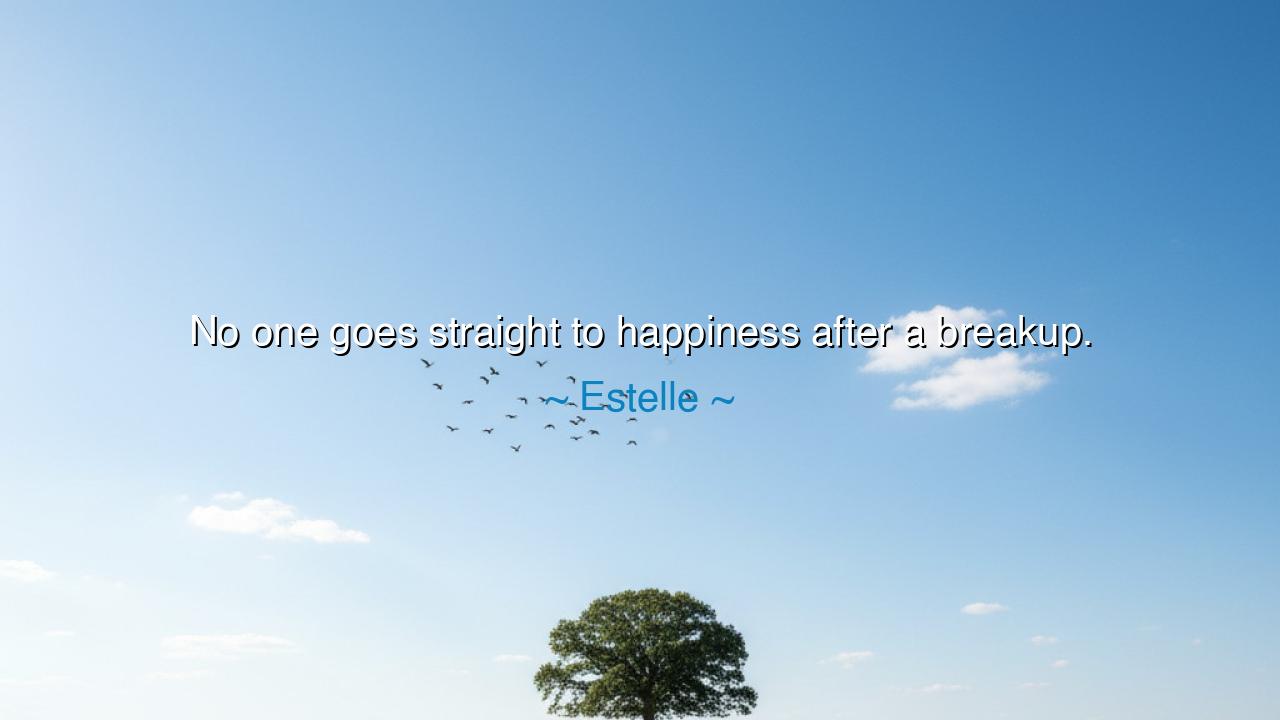
No one goes straight to happiness after a breakup.






When Estelle declared, “No one goes straight to happiness after a breakup,” she spoke not as a philosopher in robes, but as a woman who has looked into the heart of loss and learned the truth that time alone teaches. Her words carry the quiet strength of experience—the understanding that healing is not a doorway, but a journey, and that love, when broken, leaves behind an emptiness that cannot be swiftly filled. In her simple sentence lies a timeless wisdom: that pain and happiness are bound together, that one must be endured before the other can be truly known. The one who rushes to joy too soon only buries sorrow alive, and what is buried unhealed will rise again.
The origin of this quote springs from the universal story of heartbreak. Estelle, the English singer and songwriter, has lived through the sweetness and the ache that accompany love—the soaring promise of connection and the hollow silence that follows its end. Her words are born from this very human struggle: the transition from attachment to independence, from illusion to self-knowledge. To her, the path after heartbreak is not a race toward happiness, but a process of rediscovery—a passage through the valley of sadness before one can reach the mountaintop of peace. It is not weakness to grieve; it is the natural rhythm of the soul, which must descend before it can rise again.
This truth was known to the ancients long before our time. The Greeks spoke of katabasis—the descent into the underworld—as an essential part of transformation. Heroes such as Orpheus and Aeneas did not reach enlightenment without first walking through the realm of shadows. So it is with the heart. After the loss of love, one must journey inward—to confront memory, longing, and pain—before one can return to the light. Estelle’s words echo this mythic truth: that happiness does not arrive as a sudden visitor after heartbreak; it must be earned through the labor of acceptance, the courage to face one’s wounds without disguise.
Consider the story of Frida Kahlo, whose art was born from agony. When her marriage to Diego Rivera faltered amid betrayal and disillusionment, she did not flee from her pain nor paint over it with false cheer. Instead, she faced it boldly, transforming sorrow into color, heartbreak into creation. Through her suffering, she came to know herself—not as half of a union, but as a whole and fiery soul. Her happiness, when it returned, was not the innocent bliss of before, but the deeper peace that arises from self-possession and resilience. Like Estelle, Frida knew that healing is not instantaneous; it is forged in the slow fire of truth.
There is a quiet danger in pretending to be happy too soon. The one who leaps from heartbreak into forced joy often carries within them a hidden grief, unspoken and unresolved. Such denial hardens the heart, turning sorrow into cynicism or numbness. But the one who allows themselves to mourn—to cry, to reflect, to be still—eventually finds authentic happiness, not the brittle smile of denial, but the steady glow of renewal. For as the seasons of the earth must pass through winter before spring, so must the human heart pass through its season of mourning before it can bloom again.
Estelle’s words also remind us of the patience required to heal. In our world, people hunger for instant relief—distraction, revenge, or the quick comfort of new affection. But happiness built on avoidance is fragile. Real peace comes only when one has made peace with the past, when one can look upon the memory of love lost without bitterness, only gratitude. The path to such serenity may be long, but every step taken with honesty brings one closer to wholeness. To grieve well, to love oneself through pain—this is not weakness, but wisdom and courage.
So, my children of the present age, take this lesson to heart: do not rush your healing. When love falls away, let the silence teach you. Sit with your sorrow as you would with an old friend; listen to what it reveals about your heart, your needs, your strength. In time, your pain will soften into wisdom, and your loneliness will ripen into clarity. Only then will happiness return—not as a fleeting comfort, but as a steadfast companion. For as Estelle reminds us, no one goes straight to happiness after heartbreak. But those who walk through their grief with open hearts will one day find a joy far truer than the one they lost—the joy of having survived, healed, and learned to love again, beginning with themselves.






AAdministratorAdministrator
Welcome, honored guests. Please leave a comment, we will respond soon